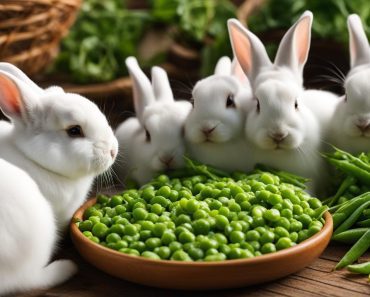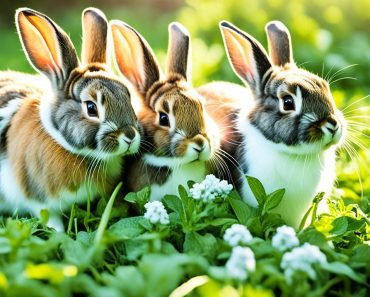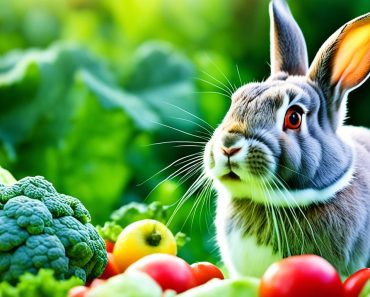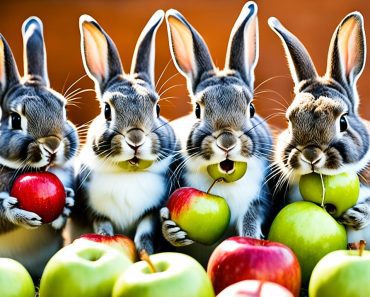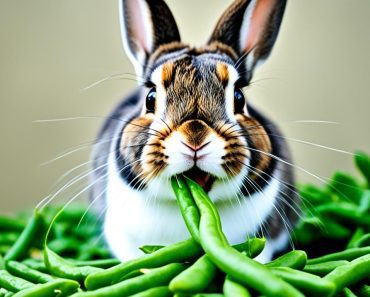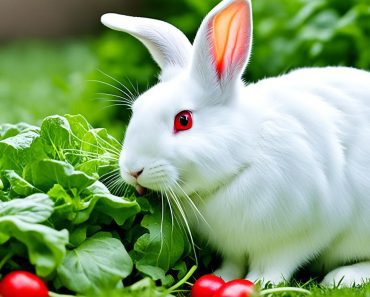Hello, I’m here to answer a common question that rabbit owners often ask: Can rabbits eat bread? As a responsible pet owner, it’s essential to understand what is safe and healthy for your furry friend to consume. In this guide, I’ll provide you with valuable insights into the rabbit diet and explain why bread is not suitable for these herbivores.
Rabbits have specific dietary needs that should be met to ensure their well-being. Their daily diet should consist of three main components: hay, fresh vegetables, and a limited amount of pellets. Hay, such as timothy or orchard grass, plays a crucial role in a rabbit’s diet as it provides them with the necessary fiber. This fiber helps maintain a healthy digestive system and keeps their teeth in good condition as rabbits have continuously growing teeth.
Timothy pellets should be offered to adult rabbits in moderation, as excessive consumption can lead to obesity and digestive issues. It’s important to remember that rabbits are prone to weight gain, so portion control is essential to their overall health.
When it comes to fresh vegetables, it’s best to provide a variety but avoid the ones that are high in carbohydrates, such as carrots. Carbohydrate-rich vegetables should be given sparingly as they can lead to weight gain and digestive problems. It’s important to maintain a balanced diet with a focus on hay as the primary source of nutrition for your rabbit.
Can Rabbits Eat Bread? Yes, they can, but they shouldn’t.
- Bread is not suitable for rabbits as it lacks nutrients and can lead to digestive issues.
- Rabbits require a diet of hay, fresh vegetables, and limited pellets.
- Hay should make up the bulk of their diet and provide necessary fiber.
- Timothy pellets should be offered in moderation to prevent obesity and digestive issues.
- Carbohydrate-rich vegetables should be given sparingly to prevent weight gain and digestive problems.
What Do Rabbits Eat?
Rabbits have specific dietary needs that are crucial to their health and well-being. A balanced diet for rabbits consists of mostly hay, a small amount of fresh vegetables, and a specific quantity of pellets. Hay, such as timothy or orchard grass, should make up the bulk of their diet as it provides essential fiber that aids in digestion.
Timothy pellets should be offered to adult rabbits in limited quantities to prevent digestive issues and obesity. These pellets are specially formulated to meet their nutritional requirements. However, it is important to note that pellets alone are not sufficient and should be complemented with hay and fresh vegetables.
When it comes to fresh vegetables, certain varieties should be given sparingly due to their high carbohydrate content. Carrots, for example, should be provided in small amounts as they can be high in sugar and disrupt the delicate balance of the rabbit’s diet.
Rabbits need a varied diet to thrive, and their nutritional needs should be met through a combination of hay, pellets, and fresh vegetables. Providing them with the right balance of these food groups will help ensure optimal health and longevity for your furry friend.
How Often Should I Feed My Rabbit?
Feeding your rabbit properly is essential for their health and well-being. Rabbits should be fed and provided with fresh water daily. As herbivores, they have specific dietary needs that must be met to ensure their overall health and happiness.
Continuous Grazers
Rabbits are continuous grazers, which means they naturally eat small amounts of food throughout the day. To mimic their natural grazing behavior, it’s important to have food available for them at all times. This includes hay, which should always be accessible to your rabbit. Hay is an essential part of their diet as it provides necessary fiber and keeps their digestive system in proper working order.
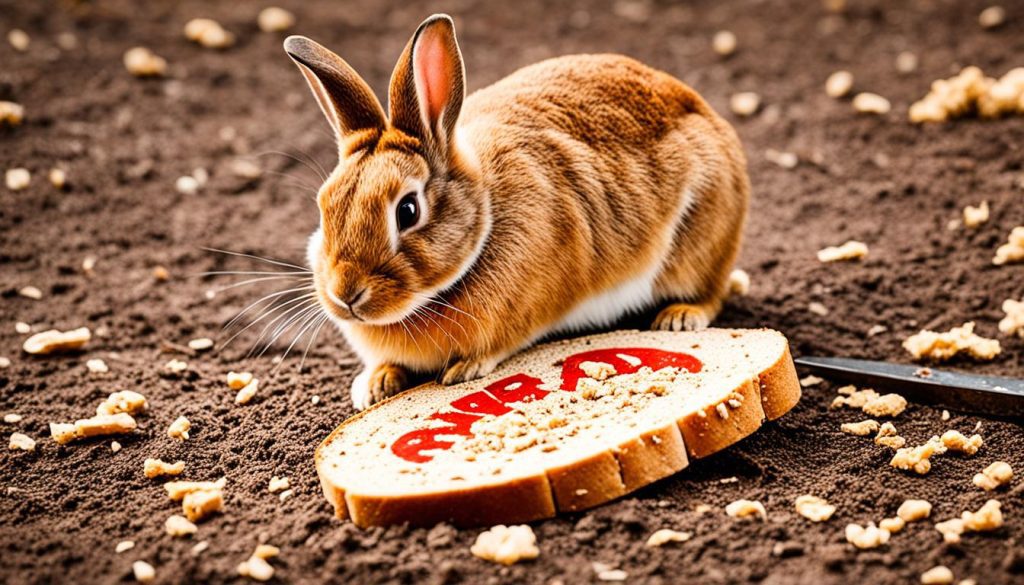
In addition to hay, rabbits should also receive a limited amount of pellets and fresh vegetables. These should be given once or twice a day, in portioned amounts that are appropriate for their size and weight. Pellets provide additional nutrients and should be chosen carefully to ensure they meet your rabbit’s specific dietary requirements.
“Providing your rabbit with food throughout the day allows them to graze and eat as they would in the wild.”
Water Requirements
Along with food, it’s crucial to provide your rabbit with fresh water daily. Clean water should always be available for your rabbit to drink. You can use either a sipper bottle or a bowl, as long as it is kept clean and the water is fresh. It’s important for your rabbit to have access to water at all times to stay properly hydrated.
By following these feeding guidelines and providing your rabbit with the proper diet and fresh water, you can help ensure their good health and happiness.
Can I Offer My Rabbit Treats?
While it may be tempting to give your rabbit treats like bread, it is important to understand what is best for their overall health and well-being. Bread, unfortunately, is not recommended as a treat for rabbits.
Rabbits have specific dietary needs, and their diet should primarily consist of hay, fresh vegetables, and a small amount of pellets. Bread lacks the necessary nutrients that rabbits require and can cause digestive problems and weight gain if consumed in excess.
“Bread lacks the necessary nutrients for rabbits and can cause digestive problems and weight gain.”
Instead of offering bread, it is best to stick to treats that are specifically designed for rabbits. There are many commercially available rabbit treats that are formulated to provide the essential nutrients rabbits need while also offering a tasty reward.
When choosing treats for your rabbit, consider the following:
- Look for treats that are specifically labeled for rabbits.
- Avoid treats that contain added sugars or harmful ingredients.
- Consider trying natural treats like small pieces of fruits or vegetables that are safe for rabbits.
Remember, treats should only make up a small portion of your rabbit’s overall diet. The majority of their food intake should come from hay, fresh vegetables, and pellets to ensure they receive the necessary nutrients for their health.
How Much Water Does a Rabbit Require?
Fresh water is essential for rabbits to stay hydrated and maintain their overall health. Rabbits should have access to clean and fresh water 24 hours a day. This can be provided through a sipper bottle or a bowl, as long as the water source is regularly changed and kept free from contaminants.
Water plays a crucial role in a rabbit’s digestion, helps regulate body temperature, and supports organ function. It is important to ensure that rabbits have continuous access to water, especially during warm weather or if they are consuming dry foods like hay.
Rabbits have different water requirements based on factors such as age, weight, and activity level. A general guideline is to provide at least 50-150 milliliters of water per kilogram of body weight per day. It’s always a good idea to consult with a veterinarian to determine the specific water needs of your rabbit.
In addition to monitoring their water intake, it’s important to regularly check the water source for cleanliness and refill it as needed. Rabbits are sensitive to contaminants in their water, so it’s crucial to ensure that the water is free from any harmful substances, such as pesticides or chemicals.
- Provide fresh water in a clean container daily.
- Refill the water container as needed.
- Inspect the water bottle or bowl regularly for any signs of damage or debris.
- Clean the water container thoroughly at least once a week to prevent bacterial growth.
By ensuring a constant supply of clean and fresh water, you are helping to promote your rabbit’s well-being and overall health.
Is There Anything Else I Should Know?
Aside from their dietary requirements, rabbits have some unique behaviors and needs to consider.
Chewing Habits
Rabbits have continuously growing teeth, which means they need to chew on objects to wear them down. Providing chew toys, such as wooden blocks or timothy hay balls, can help keep their teeth healthy and prevent dental problems.
Coprophagy: A Surprising Behavior
It may come as a surprise, but rabbits engage in a behavior known as coprophagy, where they eat their own feces. Before you get grossed out, it’s important to note that these special fecal pellets, called cecotropes, are rich in essential nutrients. By consuming them, rabbits can fully absorb the nutrients from their food.
“Providing appropriate chew toys and understanding coprophagy are crucial aspects of caring for rabbits and promoting their overall well-being.” – Dr. Emily Thompson, veterinarian
So, while it may seem strange, coprophagy is a natural and important behavior for rabbits. Understanding and supporting these behaviors is essential for their health and happiness.
Can Bunnies Eat Bread?
While rabbits can technically eat bread, it is not recommended as a staple food in their diet. Bread is high in carbohydrates and lacks the necessary nutrients for rabbits to thrive. Feeding bread to rabbits can lead to digestive problems and weight gain, which can negatively impact their overall health.
If you want to treat your bunny with bread, it should only be given as an occasional and small treat. It should never replace the essential foods in their diet, such as hay, fresh vegetables, and pellets.
Rabbits have specific dietary needs that require a balance of nutrients to ensure their well-being. Giving them bread should be done with caution, and it’s best to consult with a veterinarian before introducing any new foods into their diet.
Instead of bread, focus on providing your furry companion with a diet that consists of fresh hay, a variety of leafy greens, and a small amount of rabbit pellets. This will ensure they receive the necessary fiber, vitamins, and minerals needed for optimal health.
Remember, your bunny’s diet plays a crucial role in their overall well-being, so it’s essential to prioritize their nutritional needs and choose foods that are safe and beneficial for them.
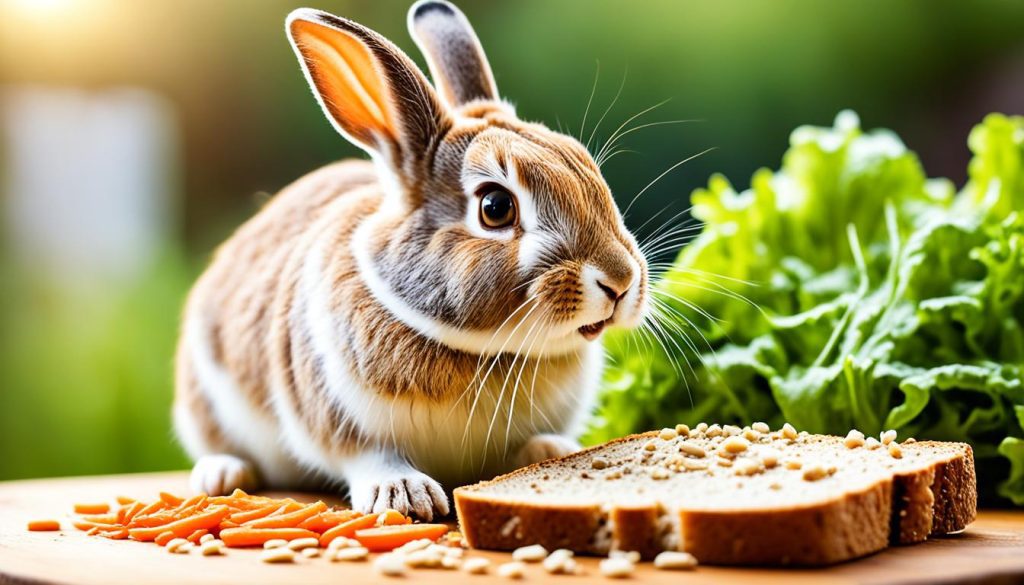
Conclusion
It is important to note that bread is not a suitable food for rabbits. While they may technically eat bread, it lacks the necessary nutrients required for their well-being. Feeding bread to rabbits can lead to digestive issues and weight gain, which can have negative effects on their overall health.
Rabbits should have a well-balanced diet that primarily consists of hay, fresh vegetables, and a small amount of pellets. Hay provides them with the essential fiber they need, while vegetables offer additional vitamins and minerals. Pellets should be given in moderation to prevent obesity and digestive problems.
When it comes to treats, it is crucial to choose options that are specifically designed for rabbits and do not contain added sugars or harmful ingredients. These treats should be given sparingly and should not replace the essential foods in their diet.
In order to prioritize the health and nutritional needs of rabbits, it is best to avoid feeding them bread. By providing them with a proper diet and suitable treats, we can ensure that rabbits lead healthy and happy lives.

